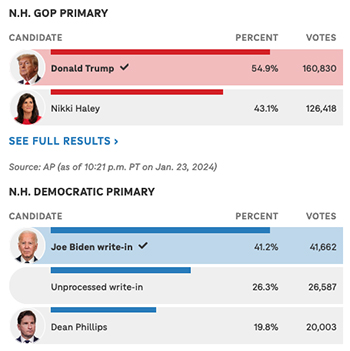By Jim Ellis — Monday, Feb. 5, 2024
President
South Carolina: Biden Romps in Dem Primary — President Joe Biden claimed Saturday’s South Carolina Democratic presidential primary, capturing an almost unanimous vote share. Biden recorded a 97 percent support figure over author Marianne Williamson (2.1 percent) and Minnesota Congressman Dean Phillips (1.7 percent). Not surprisingly, the president swept all 55 of the state’s national Democratic delegate votes and placed first in each of the Palmetto State’s 46 counties.Turnout, however, was extremely low with only about 131,000 ballots being cast. The unofficial count represents just 24 percent of the number of voters when compared to the 2020 South Carolina Democratic primary. The president was virtually unopposed in terms of the campaign efforts from Williamson and Phillips; therefore, it is not surprising to see a low participation rate. Still, three-quarters of the past electorate failing to return in 2024 does suggest a lack of enthusiasm for the pending national election.
Next, the candidates move to the Nevada primary on Tuesday where a similar result is expected. Unlike the Republicans, the Democratic primary is a delegate-apportionment event, so all candidates will be on the ballot. On the Republican side, the Nevada delegates will be awarded from the accompanying caucus events scheduled two days later, on Feb. 8. GOP candidate Nikki Haley chose to enter the primary and not the caucus, so former President Donald Trump is virtually assured of a Nevada delegate sweep.
Senate
Missouri: Sen. Hawley Up 13 — Emerson College released the first Missouri polling results of the new year. In the state’s US Senate campaign, the Emerson poll (Jan. 3-28; 1,830 registered Missouri voters; multiple sampling techniques) yields Sen. Josh Hawley (R) a 43-30 percent lead over attorney and Afghan/Iraq War veteran Lucas Kunce (D).
In 2022, Kunce ran for the Senate and performed well on the fundraising circuit, raising $5.7 million, but lost the Democratic nomination to philanthropist Trudy Busch Valentine, who was a late entry into the race. He now returns in better position to win the party nomination and has already almost equaled his 2022 fundraising total but remains a severe underdog to Sen. Hawley in a state where the Biden national campaign is sure to concede.
Therefore, considering Sen. Hawley’s incumbency and the political winds blowing against the Democrats in the Show Me State, this race is not likely to become a battleground Senate contest.
New Jersey: Sen. Menendez Again Languishing in Single Digits — Madison, New Jersey-based Fairleigh Dickinson University went into the field to test the Garden State’s Democratic electorate pertaining to the upcoming US Senate race. The survey (Braun Research conducting; Jan. 21-28; 504 likely New Jersey Democratic primary voters; live interview & text) projects US Rep. Andy Kim (D-Moorestown) to be opening a double-digit lead over New Jersey First Lady Tammy Murphy of 32-20 percent, while indicted incumbent Sen. Bob Menendez can outpace little-known labor union official Patricia Campos-Medina by only a single point, as he again polls under 10 percent.
According to the just-released Federal Election Commission year-end campaign finance reports, both Rep. Kim and Murphy held $2.7 million cash-on-hand at the end of 2023. Largely due to funds raised before being indicted, Sen. Menendez has just over $6.1 million in his campaign account.
The New Jersey primary is June 4. At this point, Sen. Menendez maintains that he is running for re-election, but a final decision from him will be likely be made just before the March 25 candidate filing deadline.
Pennsylvania: Sen. Casey Again Posts Double Digit Lead — Franklin & Marshall College, a regular Pennsylvania pollster, just released their latest statewide research iteration. The survey (Jan. 17-28; 1,006 registered Pennsylvania voters; live interview) sees Sen. Bob Casey Jr. (D) again posting a sizable lead over former hedge fund CEO David McCormick (R). The ballot test gives Sen. Casey a 12-point advantage, 47-35 percent. This counters Susquehanna Polling & Research’s findings in their Pennsylvania poll, taken partially within the same sampling period, that showed only a four-point separation between the two candidates.
The F&M result is more consistent with other released polls since mid-December. The Bullfinch Group saw a 15-point Casey margin, while Quinnipiac University projected a 10-point split. The Pennsylvania Senate race could become a top-tier contest assuming the presidential race here remains close in polling. In both the presidential and Senate contests, however, the Democratic candidate maintains the edge.







